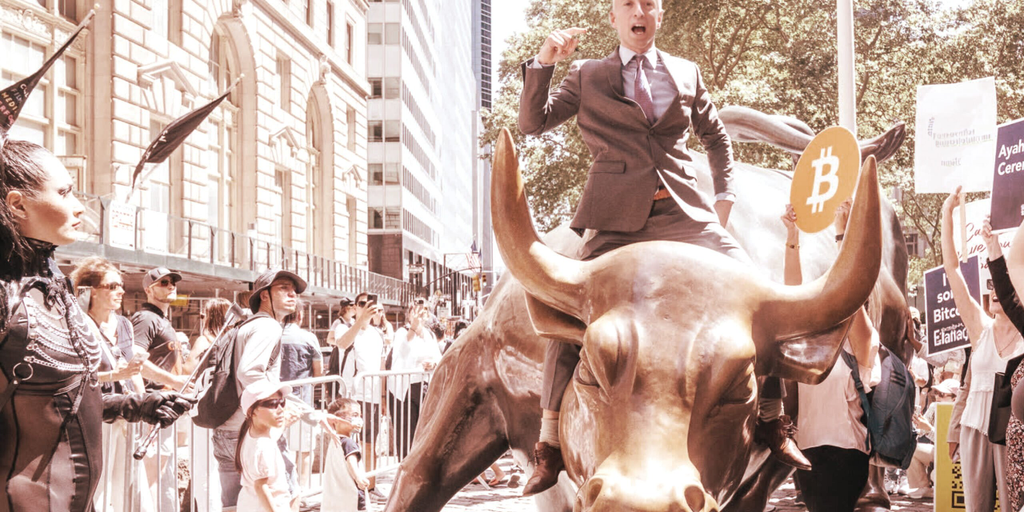Long Reads
The Year in Crypto: War on Digital Privacy
Published
3 months agoon
By
admin
Privacy is not a crime.
Yet when it comes to the crypto industry, projects and coins that enable users to tread lightly on-chain are facing higher levels of scrutiny than ever before.
In 2024, government-led efforts to combat the use of coin-mixing services continued apace as developers behind Bitcoin Fog, Tornado Cash, and Samouri Wallet all faced challenges in court. Meanwhile, so-called privacy coins faced hurdles as some exchanges stopped supporting them.
With Bitcoin’s pioneers drawing inspiration from the Cypherpunk movement, privacy and crypto have been intertwined since the industry’s beginnings as a means of internet-based resistance.
But that link, rooted in skepticism of governments and big banks, showed signs of fraying this year as exchanges navigated a maturing industry and developers faced prosecution.
As a layer-1 network, Midnight uses zero-knowledge proofs to preserve metadata associated with users, businesses, and transactions.
While it’s far different from the privacy tools the government has cracked down on, CEO Eran Barak said he’s observed a growing sense of unease among developers working on solutions that help preserve privacy on-chain.
“I think there’s definitely nervousness around the topic of privacy,” Barak told Decrypt. “People saw the hammer being thrown down on [industry] players.”
Privacy Projects
Pioneered over a decade ago, privacy coins have shielded users from prying eyes on-chain for much of the crypto industry’s existence. But this year, several exchanges distanced themselves from coins that help preserve the anonymity of their users, such as Monero (XMR).
After warning that it would delist Monero in February, Binance began converting customers’ XMR to stablecoins as part of its delisting process in September. At the beginning of this year, Binance also hit Monero competitors with a “monitoring tag” on its platform, including Zcash (ZEC) and Firo (FIRO). Still, those cryptocurrencies have yet to be delisted.
Citing regulatory changes in the European Economic Area (EEA), Monero was dealt another blow in October as Kraken said it would delist the coin on its platform for European users. Meanwhile, other cryptocurrency projects have been navigating privacy-focused scrutiny.
Secret Network, launched in 2020, is a blockchain featuring private smart contracts. Far from supporting a token that’s difficult to trace, Secret Network allows developers to build applications that support encrypted data on-chain, effectively providing a form of confidential computing.
According to SCRT Labs CEO Alex Zaidelson, multiple exchanges warned his team that Secret Network’s token could be delisted alongside Monero’s troubles. He said it took time and convincing, but eventually, the exchanges found that Secret Network was fine to offer from the perspective of anti-money laundering (AML) rules that regulated exchanges are subject to.
“We’ve seen a bunch of regulated players distancing themselves from anything related to privacy,” Zaidelson told Decrypt. “It took us work and explanation to make sure that people understand the difference between privacy coins. That and confidential computing chains.”
Zaidelson also said there’s a real need for privacy in the crypto industry if the tech has any chance of making it to the mainstream. Common examples include a hedge fund not willing to reveal its positions, he said, or a healthcare application that wants to put patient data on-chain.
“We cannot expect everybody to live in a glass house,” Zaidelson said. “You cannot build technology rails to run everything without protecting the data. It’s unimaginable.”
Coin Mixers
While privacy advocates say coin mixers can help users preserve their anonymity, the government has targeted them for years as a common tool for money launderers. Allowing users to obfuscate the source and destination of crypto transactions, the government’s crackdown on coin mixers continued this year, whether it was tied to Bitcoin or Ethereum.
Even though Tornado Cash was sanctioned by the U.S. Treasury’s Office of Foreign Asset Control in 2022—effectively blacklisting the tool for Americans—charges against the mixer’s developers wouldn’t be filed until a year later. Meanwhile, privacy advocates like whistleblower Edward Snowden decried the government’s move as “profoundly authoritarian.”
In 2023, Federal prosecutors charged Tornado Cash founders Roman Storm and Roman Semenov with money laundering, sanctions violations, and conspiracy to operate an unlicensed money-transmitting business. According to U.S. law enforcement, Semenov remains at large, while Storm was arrested and faces prosecution in the Southern District of New York.
In September, a federal judge in New York denied Storm’s motion to dismiss his three charges, ruling the case could proceed. Even though Storm’s legal fight has been portrayed within the crypto industry as a matter of free speech, the judge found that Storm’s invocation of First Amendment rights had little bearing against the legal statutes under which he was charged. Effectively, the court found that free speech protections were irrelevant at that stage in the trial.
Those attached to Tornado Cash faced legal trouble elsewhere this year. In May, a Dutch judge at s-Hertogenbosch court found Tornado Cash developer Alexey Pertsev guilty of money laundering, stating that the privacy-preserving tool was “intended for criminals,” handing down a 64-month prison sentence. While Perstev has since appealed the ruling, Ethereum co-founder Vitalik Buterin described Perstev’s prosecution as downright chilling.
“The Alexei thing is definitely really unfortunate,” Buterin said at a Berlin conference. “I think a lot of people have been going under the assumption […] that just building software is something that’s okay and is a totally legal and legit way to fight for privacy.”
In late November, a glimmer of hope for Tornado Cash emerged. The U.S. Fifth Circuit Court ruled that the Department of the Treasury had overstepped its authority in sanctioning Tornado Cash’s smart contracts, finding autonomous software can’t be considered property.
“No one wants criminals to use crypto protocols,” Coinbase’s Chief Legal Officer Paul Grewal wrote in a post on X (formerly known as Twitter). “Blocking open source technology entirely because a small portion of users are bad actors is not what Congress authorized.
A litany of cases
Though Storm’s case in a federal New York court has captivated corners of the crypto industry, he isn’t the only developer of privacy-focused crypto tools facing legal pressure there.
In April, the Department of Justice arrested and charged the developers of Saumouri Wallet with operating an unlicensed money transmitter. Allowing users to obfuscate Bitcoin transactions by combining them, prosecutors described the product as a coin mixer that had “executed over $2 billion in unlawful transactions” while facilitating $100 million in money laundering.
Rodriguez, who faces prosecution in the Southern District of New York, was denied bail in September because of “bug out prep” notes. Though Hill was released on bail, Wyoming’s Republican Senator Cynthia Lummis vocalized criticism against the overall case.
“The DOJ’s unprecedented and unlawful change in interpretation of the law threatens to criminalize core elements of Bitcoin,” she wrote in a May letter. “Wallet software is no more to blame for illicit finance than a highway is responsible for a bank robber’s getaway car.”
Roman Sterlingov, who was found guilty of money laundering charges earlier this year, operated the cryptocurrency mixer Bitcoin Fog over a decade ago. Through his maintenance of the tool, federal prosecutors alleged that he laundered over $400 million in criminal proceeds.
While the developer was arrested in 2021, he wasn’t sentenced until November. Representing one of the industry’s most notable cases involving a coin mixer, a federal judge in Washington, D.C., sentenced Sterlingov to 12 years in prison.
Ultimately, the regulatory heat for some projects with coin mixing services in the U.S. grew too intense this year. Following the arrest of Samouri Wallet developers, projects like Wasabi Wallet and Phoenix Wallet closed their doors to American users rather quickly, placing their privacy tools out of reach for the foreseeable future.
A group of lawmakers on Capitol Hill, who view coin mixers’ use as a national security concern, requested an update from the U.S. Treasury Department on Tornado Cash in November.
In a letter, they expressed concern that North Korean-linked hackers are still using the service to launder funds among a litany of elicit actors like child abusers and human traffickers.
“Despite sanctions, Tornado Cash has remained online and continues to function,” the lawmakers wrote. “This problem shows zero signs of going away anytime soon.”
Edited by Sebastian Sinclair
Daily Debrief Newsletter
Start every day with the top news stories right now, plus original features, a podcast, videos and more.
Source link
You may like


Crypto Trader Unveils Massive Bitcoin Price Target Amid Extended BTC Bull Market – Here’s His Outlook


Is it possible to make $1m with crypto?


Japan’s Metaplanet Buys Another $26M in Bitcoin Amid Tariff Market Uncertainty


Has Ethereum Price Bottomed? 3 Reason Why ETH Could Crash More


Crypto markets ‘relatively orderly’ despite Trump tariff chaos: NYDIG


Fartcoin ‘Hot Air Rises’ — $1.50 Just A Whiff Away
Dogecoin
Elon Musk and Dogecoin: How the Billionaire Became the ‘Dogefather’
Published
2 months agoon
February 15, 2025By
admin

As Dogecoin makes a comeback off the back of Bitcoin’s surge, some may be pondering: Where did the asset come from? What’s it for? And what’s Tesla CEO Elon Musk got to do with it?
The original meme coin’s boom largely has the world’s richest man to thank. Musk’s obsession with shitposting helped boost the coin to a top 10 cryptocurrency.
It’s been a wacky ride over the past few years, culminating in Musk’s appointment to lead a government agency called DOGE—yes, really. But we’ll explain it all.
2018: What the DOGE?
Dogecoin is the biggest and oldest meme coin and the second-biggest proof-of-work cryptocurrency. It was created in 2013 as a joke by developers Billy Markus and Jackson Palmer.
The idea was to poke fun at the huge number of altcoins and crypto projects entering the market following Bitcoin’s rapid ascent, and the coin enjoyed relative obscurity and a low price during its early years.
But then along came Musk. The eccentric billionaire asked Palmer in a 2018 tweet to help with the Twitter bot problem. Scammers had created a number of fake high-profile accounts, including Musk’s, in order to push crypto cons. The scams typically posted fake Ethereum giveaways.
It was the first real interest Musk had shown in Dogecoin.
2019: The pump begins
Musk started to pump Dogecoin the next year. “Dogecoin might be my fav cryptocurrency,” he wrote in April 2019, in response to a screenshot of a poll from the official Dogecoin account asking who should be the cryptocurrency’s CEO. “It’s pretty cool.”
The post would be the first of many to cause the asset’s value to rocket upwards. Soon after Musk’s first tweet about Dogecoin, the market cap of the coin hit $400 million and crypto exchange Huobi listed it.
Musk being Musk, however, didn’t stop there: He branded himself Dogecoin’s CEO—briefly—on Twitter before continuing to fire out tweets asking if the coin is “really a valid form of currency” or posting memes associated with the original dog-coin.
2020/2021: Bull run arrives
Musk continued to pump Dogecoin’s price here and there with his tweets, but things really got started during the 2021 bull run. Major exchanges like Coinbase Pro listed Dogecoin and the asset developed a bigger cult following, not to mention growing mainstream awareness.
DOGE gained a market cap bigger than many companies in the S&P 500. And developers exclusively told Decrypt that they had secretly been working with Musk since 2019 to make the coin a valid payment method and a greener, cheaper alternative to Bitcoin.
But things got stranger when Musk called himself the “Dogefather” ahead of a “Saturday Night Live” skit about the cryptocurrency—again sending the asset’s price roaring upwards. DOGE would jump to its all-time high price of about $0.73 at this time.
Musk’s “SNL” appearance ended up being underwhelming for Doge fans, with the SpaceX boss and his mother’s allusions to the coin ultimately pushing its price down. Still, it continued to bring the strange world of meme coins to the mainstream.
Later that year, Musk announced that his rocket company, SpaceX, would launch a satellite to the moon—completely funded by the cryptocurrency.
2022: Tesla/Twitter mania
The Doge mania continued into 2022 when Musk’s car company started accepting Dogecoin for merchandise.
Dogecoin continued to experience price bumps when Musk bought Twitter and rebranded it to X, hinting that it would also become a payments platform that might, eventually, integrate the O.G. meme coin.
Things came back to bite Musk later that year, though, when an American man hit the billionaire and Tesla and SpaceX with a $258 billion lawsuit for allegedly pumping Dogecoin—an asset with “no value at all,” according to the original filing.
But Musk and his lawyers scored a win this year when a judge sided with them and dismissed the lawsuit, calling the tech entrepreneur’s tweets about Dogecoin “aspirational and puffery,” and noting that “no reasonable investor could rely upon them.”
2024: Trump, Musk, and DOGE
Dogecoin had a relatively quiet 2023, but the meme coin has soared in recent months following Musk’s support of Republican Donald Trump’s campaign for the White House.
That’s mostly because Trump said that Musk would lead a government efficiency commission ahead of being voted back into the seat of power; Musk claimed that it would be called the Department of Governmental Efficiency—an acronym that matches Dogecoin’s ticker.
Whenever Musk mentioned his future political role with the so-called DOGE ahead of the election, the price of Dogecoin jumped.
But before Trump’s shock election win, Musk revealed what he has probably thought all along: that he isn’t seriously interested or involved in Bitcoin, Dogecoin, or any cryptocurrency. He just likes the meme coin.
“I’m actually not actively involved in crypto,” he said at a rally. “I make Dogecoin jokes and stuff because I just kind of like Dogecoin—because it’s got the best sense of humor and it has dogs and memes, and I love all those things.”
Still, the price of Dogecoin boomed higher, hitting a three-year high price of $0.48—though it’s fallen since, as of this writing. Musk has recently praised Dogecoin’s rate of inflation and tweeted out a familiar meme image of a dust cloud with the Doge face engulfing a city.
And President-elect Trump made it official that Musk would lead the administration’s new department, though planned co-lead Vivek Ramaswamy bailed in January due to other political ambitions.
Trump is even selling t-shirts showing himself and Musk alongside Doge-esque artwork. And the official DOGE website briefly featured the familiar DOGE meme imagery, boosting Dogecoin’s price in the process.
With Trump back in office, Musk’s DOGE has started aggressively interrogating U.S. government spending, grabbing headlines as it accesses potentially sensitive citizen data while upending professional norms in the process.
Edited by Andrew Hayward
Editor’s note: This story was originally published on November 13, 2024. It was last updated with new details on February 15, 2025.
Daily Debrief Newsletter
Start every day with the top news stories right now, plus original features, a podcast, videos and more.
Source link


As the Securities and Exchange Commission’s five voting members sat before lawmakers on Capitol Hill in September, House Financial Services Committee Chair Patrick McHenry (R-NC) pressed the agency’s head about a supposed lack of regulatory clarity regarding crypto.
“The laws are clear, and it’s written by the Supreme Court,” SEC Chair Gary Gensler began to say before McHenry cut him off—turning to Gensler’s Republican-appointed colleague, SEC Commissioner Hester Peirce, to ask about the agency’s stance on crypto regulation again.
“We’ve taken a legally imprecise view to mask the lack of regulatory clarity,” Peirce responded, with Gensler just a few feet away. “It’s always helpful to have Congress weigh in, but there certainly are some guidelines we could provide in this area that we have chosen not to.”
The exchange lasted minutes, but it underscored years-long tension over the SEC’s regulatory approach to crypto. It also highlighted a partisan divide within the agency over whether broad swathes of the crypto industry fall under its remit, requiring digital asset firms to abide by the agency’s decades-old rules relating to securities.
Gensler, who once said that “everything but Bitcoin” falls under the agency’s purview, served as a political cudgel this year, even as President-elect Donald Trump curried favor with the crypto industry. Nonetheless, Wall Street’s top cop leaned into the agency’s enforcement blitz, ticketing crypto firms for allegedly violating its rules while putting several others on notice.
Gensler, who was appointed by President Biden to lead the SEC, indicated last month that his tenure was ending. He signaled he’d leave when Trump begins his second term on January 20, 2025.
Trump, delivering on one of his crypto-related campaign promises, has appointed former SEC commissioner Paul Atkins to replace Gensler.
“I would expect Paul Atkins to have a completely different approach,” Stephanie Avakian, a partner at WilmerHale, who formerly served as director of the SEC’s Division of Enforcement, told Decrypt. “He is both experienced and practical and is well-known.”
Crypto advocates may be excited about the prospect of Atkins’ leadership, but it remains to be seen where the nominee could take existing lawsuits against crypto companies like Binance, Coinbase, Ripple Labs.
Anthony Tu-Sekine, a partner at Seward & Kissel, told Decrypt the SEC could face reputational harm if it quickly abandoned the high-profile cases after pressing forward with them and expending resources.
“The SEC is more like a supertanker than a race boat,” Tu-Sekine said. “Don’t expect Atkins to become chairman and come out two days later and say we’re dropping all those cases. The staff has worked diligently on these cases, came to a conclusion about the law, and ultimately ended up convincing the higher-ups that a suit should be brought,” he said.
Capitol Hill
When Gensler was nominated to lead the SEC in 2021, industry participants were cautiously optimistic. However, Gensler’s experience teaching a class on blockchain at MIT did not lead to clearer “rules of the road,” as some had hoped.
In maintaining that existing laws were sufficient to regulate digital assets, he emerged as an industry antagonist. An aggressive string of crypto-related enforcement actions meanwhile heightened advocates’ concerns that the agency’s approach was overzealous.
Reflecting on his tenure as SEC Chair in November, Gensler stood by the agency’s focus on fostering compliance with securities laws in the crypto market. Having drawn comparisons to the “Wild West” before, the sheriff hitched his agency’s approach to protecting investors.
“This is a field in which over the years there has been significant investor harm,” Gensler said. “Further, aside from speculative investing and possible use for illicit activities, the vast majority of crypto assets have yet to prove out sustainable use cases.”
That same day, 18 states filed a lawsuit against the SEC, alleging that the regulator’s enforcement-based gambit violated the law. Brought by Republican attorney generals and the DeFi Education Fund, the accusations of regulatory overreach highlighted a sense of political angst that the President-elect had seized on months before.
“I will fire Gary Gensler on day one,” Trump vowed at a Bitcoin conference in July. “The day I take the oath of office, Joe Biden and Kamala Harris’ anti-crypto crusade will be over.”
Gensler’s leadership was scrutinized time and again by Republican lawmakers on Capitol Hill, but the sentiment that existing laws were good enough received bipartisan pushback this year. As 71 Democrats in the House of Representatives voted in favor of a crypto market structure bill in May alongside Republicans, they signaled the status quo needed some form of overhaul.
Both chambers of Congress also passed a bill that would have repealed SAB 121, SEC guidance requiring banks to recognize digital assets as liabilities on their balance sheets. After President Biden vetoed the bill, House members failed to override it. However, 21 Democrats showed opposition to Biden’s veto, so there was bipartisan support there, too.
The crypto industry’s unprecedented political spending efforts in 2024 likely contributed to lawmakers’ performance. The Democratic presidential nominee, Kamala Harris, later distanced herself from the SEC’s approach, advocating for a regulatory framework as Election Day approached, but by that time, it was too late.
As Vice President Harris rose to the top of the Democratic ticket, Rep. Wiley Nickel (D-NC) previously told Decrypt that there were signs the presidential nominee would take a “balanced approach” to crypto. Mark Cuban threw his hat into the ring as a potential successor to Gensler, but the billionaire’s ambitions of leading the agency ultimately fell short.
‘Not great for entrepreneurs’
Even though the SEC faced several setbacks in court, the Commission had a banner year in terms of the amount of cash that enforcement actions brought in. Meanwhile, the agency pushed forward with high-profile lawsuits, tuning out the political heat that Gensler faced.
In fiscal year 2024, the SEC secured $8.2 billion in penalties across 583 enforcement actions affecting U.S. capital markets. Of that sum, $4.5 billion came from a lawsuit against Terraform Labs and its founder, Do Kwon. They were found liable for civil fraud charges related to the $40 billion collapse of UST and LUNA in 2022.
The lawsuit marked a major victory for the SEC, as a federal judge determined that Kwon and Terraform Labs had offered LUNA and UST to investors as securities. However, the SEC encountered a significant setback in the Southern District of New York, where the case was filed.
After finding that XRP, a token stewarded by Ripple Labs, was not “necessarily a security on its face,” a federal judge ordered Ripple to pay $125 million in fines for XRP transactions that did violate the law. The SEC later appealed the ruling, but it had sought $2 billion in civil penalties after bringing the case in 2020—before Gensler came to lead the agency.
“Charitably, the SEC got a bloody nose,” Tu-Sekine said.
Still, the SEC was able to hold on to lawsuits against Binance and Coinbase. Last year, the regulator alleged that both firms violated its rules, allegedly operating as unregistered exchanges, broker-dealers, and clearing agencies, among other accusations.
In March, a federal judge found that arguments alleging Coinbase offers investors unregistered securities were plausible, denying most of the company’s motion to dismiss. In June, a federal judge ruled that the SEC’s case against Binance could also proceed, while charges related to the leading crypto exchange’s Simple Earn product and certain token sales were dismissed.
Those lawsuits, along with one against crypto exchange Kraken, are ongoing. The legal costs associated with crypto-related enforcement actions are increasing, according to the Blockchain Association, an advocacy group that estimated the figure to be at least $400 million, using self-reported data from its member companies.
“While that creates a lot of work for lawyers, it is not great for entrepreneurs,” CEO Kristin Smith told Decrypt. “In terms of whether their projects comply with the U.S. securities laws, they have to read between the lines of various court opinions and briefs that the SEC submits.”
Some lawsuits initiated last year came back to bite the SEC, namely the Commission’s case against DEBT Box, a crypto mining firm. In August 2023, SEC attorneys attained an ex parte restraining order against the firm, freezing DEBT Box’s assets before it could argue otherwise.
In May, the case was dismissed as a federal judge ordered the SEC to pay $1.8 million for DEBT Box’s legal fees. The regulator had made “false and misleading statements” in attaining the restraining order, Utah District Court Judge Robert Shelby found. A week later, the SEC closed its regional office that had brought the case, citing “significant attrition.”
Enforcement threats
Minutes after Gensler signaled his resignation in November, a federal judge in Texas dealt the agency another blow. By expanding the definition of “dealer,” the SEC would’ve forced decentralized finance projects to register as securities exchanges and brokers. But the court found that measure was unlawful, ordering the SEC to axe the modifications in question.
While the SEC has focused on crypto exchanges and digital asset issuers under Gensler’s leadership, the Commission’s scope expanded this year in terms of enforcement threats. Issuing Wells Notices, the SEC warned firms a lawsuit could be coming in areas previously untouched, such as decentralized finance (Uniswap Labs), NFTs (OpenSea), and gaming (Immutable).
Additionally, the Commission issued enforcement warnings to companies such as the trading app Robinhood, examining its cryptocurrency offerings after the firm tried to “register” its services with the agency, which Gensler had urged digital asset firms to pursue earlier.
“This is not the way Americans expect our government to work,” Robinhood’s legal chief and former SEC commissioner Dan Gallagher later testified before Congress. “Rather than issue rules to provide regulatory certainty to an industry craving it, the SEC has instead targeted individual firms, including Robinhood, through regulation by enforcement.”
Ultimately, Gensler’s leadership had “an immense chilling effect” on the crypto industry, Katherine Snow, general counsel at Thesis, a venture capital firm, told Decrypt. Either forcing companies to axe projects or move overseas, she said the U.S. will have to pick up the pace to compete with regulatory progress on crypto made internationally.
However, Snow saw one noticeable drawback with Gensler’s slated departure. Over the past several years, legal minds across the industry have been united in fighting what was perceived as an existential threat.
“Because we had this common enemy, everyone was able to really rally behind each other,” Snow said. “It’s going to be pretty fascinating to see what the approaches are of the various trade associations over the coming months and years, as we approach this new SEC.”
Edited by Sebastian Sinclair
Daily Debrief Newsletter
Start every day with the top news stories right now, plus original features, a podcast, videos and more.
Source link
Long Reads
From DMM Bitcoin to the US Government: Largest Crypto Exploits and Hacks of 2024
Published
4 months agoon
December 25, 2024By
admin

Hackers have grown more sophisticated and continue to rake in billions of dollars from crypto exploits.
The good news? There isn’t any—2024 has officially surpassed last year’s totals for stolen funds, with months of hacks piling on to an already record-breaking year.
By Q3 2024, blockchain intelligence firm TRM Labs reported that over $2.2 billion had been stolen in crypto hacks—exceeding the $1.8 billion lost in all of 2023.
Now, as the year comes to a close, the total continues to climb. Analysis reveals that thefts weren’t limited to the experimental world of decentralized finance, or DeFi; centralized crypto exchanges were also prime targets.
Here are the biggest crypto heists of 2024.
DMM Bitcoin’s $308 million
Japanese crypto exchange DMM Bitcoin lost over 4,500 BTC—worth $308 million at the time—to hackers back in May.
It’s unclear how hackers managed to steal from the exchange, but TRM Labs said that stolen private keys were a plausible explanation.
The company is still shutting down and transferring customer accounts to another exchange, SBI VC Trade, which is taking over its assets.
PlayDapp’s $290 million
Hackers targeted the crypto gaming platform PlayDapp twice in February by exploiting a private key vulnerability. They made off with $290 million in PLA tokens across the two incidents.
The attackers also ignored a $1 million white hat reward to return the stolen funds. To this day, the funds are still missing.
WazirX’s $235 million
Indian crypto exchange WazirX was also targeted in June, with hackers running away with close to $235 million.
WazirX suspended all withdrawals, leaving users unable to access their funds after the hack. Elliptic said that the attack was linked to North Korea.
The exchange’s parent company, Zettai Pte Ltd, secured a four-month moratorium from the Singapore High Court in August in a bid to get its finances in order.
Things took a weird twist in October when the co-founder of rival exchange CoinSwitch accused WazirX of transferring $75 million worth of user funds to top exchanges Bybit and KuCoin in the wake of the attack.
WazirX has since said that it’s in the process of “rebalancing tokens,” and clients will soon be informed on the next steps to repay creditors.
Ripple co-founder Chris Larsen’s $112.5 million
Hackers targeted Ripple co-founder and Executive Chairman Chris Larsen’s XRP stash on January 30. The crypto entrepreneur wrote on X that there had been “unauthorized access to a few of my personal XRP accounts,” but reassured people that Ripple itself hadn’t been targeted.
Still, it was a hefty attack, and blockchain sleuth ZachXBT said that hackers made away with about 213 million XRP—$112.5 million at the time—before laundering it through exchanges. Efforts to recover the stolen assets have been unsuccessful.
Orbit Chain’s $80 million
The year began with a significant DeFi breach, as hackers drained over $80 million from the cross-chain bridge project Orbit Chain on January 1. Criminals took off with Ethereum and the stablecoin DAI in the exploit—and then fell silent.
Months later, millions of dollars of the stolen crypto was moved to coin mixer Tornado Cash. Other than a January statement apologizing for the exploit, the team behind the project has since given little update on what happened—or how it would retrieve the stolen funds.
BtcTurk’s $54 million
On June 22, hackers targeted the Turkish crypto exchange BtCTurk—which caters to the country’s budding market. Most of the funds were in the form of Avalanche (AVAX), the 12th-largest digital asset by market capitalization.
The exchange reassured users that most funds—kept in cold storage—were safe. Meanwhile, a day after the hack, Binance CEO Richard Teng said his exchange had frozen $5.3 million in stolen funds to assist BtcTurk’s efforts.
Radiant Capital’s $50 million
In October, Hackers hit DeFi project Radiant Capital in “one of the most sophisticated hacks ever recorded in DeFi,” making away with $50 million in tokens at the time.
The breach happened after a Radiant developer received a Telegram message from what appeared to be a former contractor, the protocol said. The message contained a PDF, which was then used to deliver malware and subsequently gain control of several private keys, allowing hackers to steal USDT, USDC, and ARB tokens.
Radiant Capital, which allows users to earn interest and borrow crypto, has since said that North Korean hackers were behind the attack.
U.S. government’s $20 million
Hackers even targeted the Feds this year with over $20 million worth of stablecoins and Ethereum disappearing in October from a government wallet containing funds seized from criminals.
The crypto in question was tied to a previous 2016 hack of the Bitfinex exchange. Hackers sent the coins and tokens to a new address, prompting pseudonymous blockchain sleuth ZachXBT to say it was likely a theft.
Then, the next day, close to $19.3 million worth of the pinched funds were returned to the wallet, data collected by Arkham Intelligence shows. It still isn’t clear what happened to the rest of the stolen crypto—or why hackers returned it in the first place.
Edited by Sebastian Sinclair
Daily Debrief Newsletter
Start every day with the top news stories right now, plus original features, a podcast, videos and more.
Source link

Crypto Trader Unveils Massive Bitcoin Price Target Amid Extended BTC Bull Market – Here’s His Outlook

Is it possible to make $1m with crypto?

Japan’s Metaplanet Buys Another $26M in Bitcoin Amid Tariff Market Uncertainty

Has Ethereum Price Bottomed? 3 Reason Why ETH Could Crash More
Michael Saylor Teases New Bitcoin Buy After Strategy’s $7.69 Billion Q1 BTC Buying Spree

Crypto markets ‘relatively orderly’ despite Trump tariff chaos: NYDIG

Fartcoin ‘Hot Air Rises’ — $1.50 Just A Whiff Away

What happened to the RWA token?

Crypto Strategist Sees Solana-Based Memecoin Surging Higher, Says One AI Altcoin Flashing Strong Chart

Mantra Team Responds As The OM Token Price Crashes Over 80% In 24 Hours

This Week in Crypto Games: Gaming Tokens Crash Out, Eve Frontier Opens Up

Commerce Secretary Lutnick walks back tariff relief on electronics

Gold ETF Inflows Hit Three-Year High as PAXG, XAUT Outperform Wider Crypto Market

Israel’s New Study Shows 51% Of Public Is Interested In Adopting CBDC (Digital Shekel) – Is That So?

Solana Price Eyes Breakout Toward $143 As Inverse Head & Shoulders Pattern Takes Shape On 4-hour Chart

Arthur Hayes, Murad’s Prediction For Meme Coins, AI & DeFi Coins For 2025

Expert Sees Bitcoin Dipping To $50K While Bullish Signs Persist

Aptos Leverages Chainlink To Enhance Scalability and Data Access

Bitcoin Could Rally to $80,000 on the Eve of US Elections

Crypto’s Big Trump Gamble Is Risky

Institutional Investors Go All In on Crypto as 57% Plan to Boost Allocations as Bull Run Heats Up, Sygnum Survey Reveals

Sonic Now ‘Golden Standard’ of Layer-2s After Scaling Transactions to 16,000+ per Second, Says Andre Cronje

Ripple-SEC Case Ends, But These 3 Rivals Could Jump 500x

Has The Bitcoin Price Already Peaked?

A16z-backed Espresso announces mainnet launch of core product

The Future of Bitcoin: Scaling, Institutional Adoption, and Strategic Reserves with Rich Rines

3 Voting Polls Show Why Ripple’s XRP Price Could Hit $10 Soon

Xmas Altcoin Rally Insights by BNM Agent I

Blockchain groups challenge new broker reporting rule

I’m Grateful for Trump’s Embrace of Bitcoin
Trending

 24/7 Cryptocurrency News5 months ago
24/7 Cryptocurrency News5 months agoArthur Hayes, Murad’s Prediction For Meme Coins, AI & DeFi Coins For 2025

 Bitcoin3 months ago
Bitcoin3 months agoExpert Sees Bitcoin Dipping To $50K While Bullish Signs Persist

 24/7 Cryptocurrency News3 months ago
24/7 Cryptocurrency News3 months agoAptos Leverages Chainlink To Enhance Scalability and Data Access

 Bitcoin5 months ago
Bitcoin5 months agoBitcoin Could Rally to $80,000 on the Eve of US Elections

 Opinion5 months ago
Opinion5 months agoCrypto’s Big Trump Gamble Is Risky

 Bitcoin5 months ago
Bitcoin5 months agoInstitutional Investors Go All In on Crypto as 57% Plan to Boost Allocations as Bull Run Heats Up, Sygnum Survey Reveals

 Altcoins2 months ago
Altcoins2 months agoSonic Now ‘Golden Standard’ of Layer-2s After Scaling Transactions to 16,000+ per Second, Says Andre Cronje

 Price analysis5 months ago
Price analysis5 months agoRipple-SEC Case Ends, But These 3 Rivals Could Jump 500x




